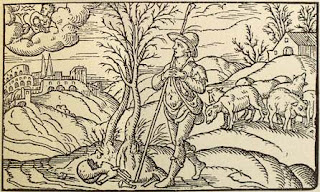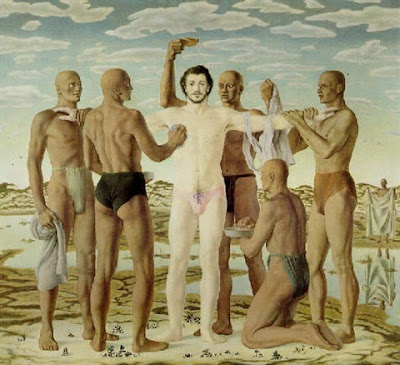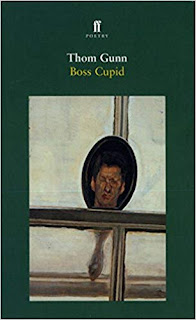Scott, Wong and Gunn, The Poetics of Sex
Writing in The Poetics of
Space, Bachelard discusses box-like spaces in terms of intimacy and security.
Locked boxes represent hiding, are protected hermetic spaces. Though they are
never absolutely safe, he remarks, because they can be threatened by extreme
violence. (And it should be added: guile). These thoughts echo around the
toilets in gay poetry, not in quite the way that Bachelard would have seen. But
yes, cubicles, from the Latin “to lie down”, are confined spaces, like shells,
that open up to a world beyond their smallness— they have an interior life that
is separate from the outside. Also, they are places open to police entrapment
and surveillance.
The confined space of the toilet-box, as Marc Siegel has argued (in relation to a 2017 art exhibition in Berlin that featured
men and urinals) is a synecdoche for the
closet, for the shame in which gay men seal themselves away with forbidden
desires. The Pissbudenschwulen, cottagers or tea-room users, are viewed in German gay culture as the lowest level in the gay sexual
hierarchy. Three very different poems by Thom Gunn (The Passages of Joy, 1982),
Nicholas Wong, (Crevasse, 2015) and Richard Scott (Soho, 2018) reveal different
visions of the toilet/closet. Reading them chronologically, but in reverse, is
interesting, in terms of what they say about gay “identity” and how they
operate as poems.
Public Toilets in Regents Park.
The men hear are bird footed
feathering past the attendant’s
two-way mirror
unperturbed by the colonising
micro-organisms
bulleidia cohetia shigellosis
Scott’s “bird footed” dehumanises
the cottaging men from the onset and the meaning isn’t exactly clear. Is the
reader to imagine them as web-footed and adapted for puddles of water? Or does
Scott mean that they resemble dinosaurs? The term “bird footed” usually appears
in Paleontology. The gay men blur as they pass the spying mirror, if we read
“feathering” in a technological way. As is typical with Scott, the poetry moves
excitedly with thematic metaphors and there is a tendency to word-play rather than fix a real scene: “feathering” is
looking towards the end of the poem where gay men have idiomatically feathered
their nest. In lines 3-4 there is a switch to a medical register and
“colonising” indicates that the men are not in control— are subject to disease's colonial
rule and infection.
Stanza 2 develops this theme: this
is a place where the “fist deep” pool” in the u-bend and the activities on
offer produce a risk of venereal infection. Of course, Scott intends the
sexual-pun on “fist-deep” and “fisting”, but is the cleverness appropriate
here? Fisting is not an activity usually associated with cottagers, those on the borders of gay
sex, nor is it likely in a small cubicle. The iconography of cottaging centres on the glory hole. Here, again, Scott is playing with images rather than imagining
the psychology of the scene. The men are cyphers in a language game.
Compare this with Wong:
Self-portrait as a Cubicle.
Keep me clean—
that microbial oval toilet seat,
over-used, turned
ivory with occasional drips
of yellow
a Jackson Pollock
on periphery.
Literally, Wong provides a ground
perspective. In a state of metamorphosis he has become the cubicle. He seats
himself objectively outside the act. The poem fulfils the next stanza:
Keep me sanitized
The poetry is cleaned up. Superfluous
words are removed. And it cleverly reverses Duchamp’s art process. His infamous
readymade, Fountain 1917, became a work of art because of how he saw it.
Here,
the cubicle claims art as its own. The poem turns craftily on “drips/of
yellow.” The “drip” paintings of Pollock are conjured up and the toilet signs
itself as a work of art. At the closing of the poem, the cubicle is animated
into a human participant. By removing himself to an object outside of himself,
Wong depicts not only the isolation that comes with being gay but also the
alienation that comes with writing his experiences, especially intimate sexual one, in a colonial language.
These poems show two very
different views of sexualised cubicles. Thom Gunn’s version of the
closet/toilet is written from an entirely human perspective. His poem is an
impulsive and known encounter, rather than an improvised and anonymous one. By
setting it within dialogue, as a story being told, Gunn preserves an intimacy
between two men and draws a reader into the poem as a third party.
The Miracle.
“Right to the end, that man, he
was so hot,
That driving to the airport we
stopped off
At some McDonald’s and do you know
what,
We did it there. He couldn’t get
enough.”
— There at the counter? — “No, that’s public stuff
‘There in the rest room. He pulled
down his fly,
And through his shirt I felt him
warm and trim.
I squeezed his nipples and began
to cry
At losing this my miracle… [“.]
This poem is model Gunn. Iambic
pentameter is loosened into memorable
speech and exact casual rhymes create a bound experience. Within traditional
form, unorthodox subject matter is gradually exposed. And the eye is firmly on
sensation, especially touch, as language moves towards a spiritual,
psychological boundary— “my miracle”.
How far a poem can travel in a
short space of time is often a test of quality. By the close of Scott’s poem, a
reader has moved through some rather forced ornithological metaphors, “a
beautiful cock unfolding like a swan’s neck”, heard “gasps of contact…inside
each nested cubicle” (do toilet cubicles nest inside one another like living
room coffee tables or storage boxes?), to the point where the sexual occupants
“disperse as mallards from the face of a pond”. The termination of the poem is appropriate, it does portray how the cottaging males escape quickly and return to
their natural environment. They merge once again into their parkland habitat.
But the poem has done nothing new: it has described cottaging in lurid detail,
as a locus of shame, and that is it.
Wong’s poem concludes by drawing
together a variety of eyes. The art object views the eye peering through a hole
in its body and beholds the human in the next cubicle as a lover of beauty: it
sees in its artistic terms.
You peep
through it, a fecund
kaleidoscope
for a face—
less prepuce
cordoned off by me.
Kaleidoscope etymologically is
made from “beauty” and “form”, though “scope” suggests seeing and visual form.
The words rotate as a kaleidoscope does. A reader sees (with the cubicle) an
eye gazing through the hole. The adjective “fecund” suggests intellectual/aesthetic
productivity, exactly what the lavatorial art object would perceive. The “face”
in the next cubicle is reduced to its hole, but the existence of a face is
acknowledged. A further reduction occurs as “face” becomes “faceless prepuce” and a penis obliterates the
human: the man is nothing except his penis. The poem ends by observing with a
sense of wonder and vision whilst recognising that the sexual act is
“cordoned”, restricted by the wall of the cubicle, and also, if we think of
“cordoned” as a line of bodies or a rope marking off a prohibited scene, an act
that is policed by the cubicle and by society. This is a fine example of
concision— a lot is covered in a few lines.
At the close of “The Miracle”, a miraculous
love is symbolised by a stain that is left on one of the men’s boots as a result of sex. This
leads to:
— “Snail track?” – Yes there.” – “That was six months
ago.
How can it still be there?” – “My
friend, at night
I make it shine again, I love him
so,
Like they renew a saint’s blood
out of sight.
But we’re not Catholic, see, so
it’s all right.”
Gunn’s Hardyesque poem, based on
an anecdote told to him, converts the anonymity of the corporate bathroom into
a scene for corporeal desire and wonder-working: the lover becomes a pilgrim
who keeps his holy artefact in great shape by artifice. The poem is told with
wit and human sensitivity, and inserts American gay sex (provocatively) into
established English traditionalism. This poem bends Hardy, as does the epigraph
at the start of Boss Cupid (2010): “… a cool, queer tale.”
Scott, Wong and Gunn are three
poets of the body, but they have very different perspectives on being gay. These
three poems from three countries and three continents— the UK, Hong Kong and the
USA, Europe, Asia and North America— record Klappensex with distinctive and
challenging perspectives.




Comments